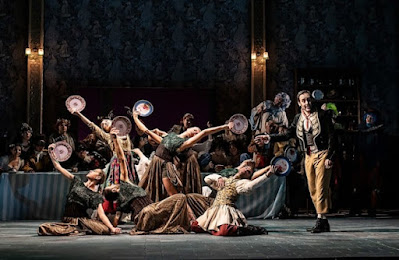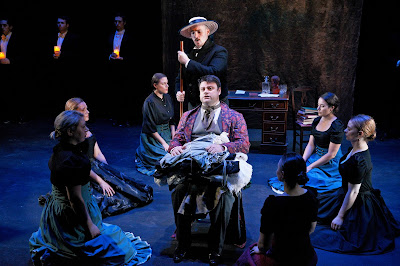Richard Wagner - Die Walküre
Staatsoper unter den Linden, Berlin - 2022
Christian Thielemann, Dmitri Tcherniakov, Robert Watson, Vida Miknevičiūtė, Mika Kares, Michael Volle, Anja Kampe, Claudia Mahnke, Christiane Kohl, Clara Nadeshdin, Anna Samuil, Michal Doron, Natalia Skrycka, Karis Tucker, Anna Lapkovskaja, Alexandra Ionis
ARTE Concert - October 2022
Das Rheingold didn't offer up too many clues as to the direction it was going to take in the remaining parts of the tetralogy, other than being very much within the familiar operatic worldview and aesthetic of director Dmitri Tcherniakov. Die Walküre is a place where worlds come together, where there is a deeper delving into the past and a relationship established between the present and the future and it's more of a test of whether a director has any ideas that he wants to take forward in the remaining parts of the work. Unfortunately, it appears that if Tcherniakov has anything more to offer, he is still keeping his cards close to his chest at this stage.
Act I doesn't offer up much in the way of interest, either visually, in concept or in singing performances. Notionally, we are still within the human behavioural experiment laid out in Das Rheingold, the director here applying more relatable imagery to the pursuit of Siegmund as an escaped prisoner. Unfortunately Siegmund has inadvertently and unfortunately sought to seek shelter in the home of Hunding, who is a prison warder. If Das Rheingold went for the familiar Tcherniakov imagery of behavioural science and therapy in an enclosed world of high wooden walls (Carmen, Pelléas et Mélisande, Les Troyens), here the spaces are more open and exposed, like his Lulu, Hunding's home a framework of doorways in a modern house, with no sign of a sword in an ash tree. That's not a security camera though, Notung is buried up to the hilt in the ceiling.
It's not so much the modern setting that is out of place, as much as it's not entirely clear what Tcherniakov is trying to show us. It doesn't seem to relate in any meaningful way with what has come before, nor does it even seem to have any consistency within itself or in relation to the composer's original intentions. The clash with Wagner's sensibilities becomes more pronounced as the act progresses, as Siegmund and Sieglinde become enraptured in their joint destiny. It's not just that it diverges from Wagner's intentions, but it doesn't even fit in with the convict/prison officer concept. Unfortunately, the singing of Robert Watson and Vida Miknevičiūtė doesn't really make this any more convincing or give it the lift it needs.
One theme that is perhaps hinted at however is the wider idea of a surveillance society, of powers reaching into and controlling our everyday lives. This becomes more apparent when we get to Act II, but it's already suggested at the start of the opera where Wotan was seen observing what is going on from his window of office in Valhalla. It also has the benefit of blending the acts together as a way of creating a closer unity between the events in the distinct acts of this opera. Siegmund and Sieglinde run off at the start of Act II, leaving Wotan and Brünnhilde to walk through Hunding's home, unseen by the prison warder, the set rotating through to a Valhalla office room for the scene between Wotan and Fricka. Rotating shows that the actions of gods are not detached or unrelated from what is to play out, but exert control and direction towards consequences that might be unintended.
The folly of Wotan's actions are summed up in his admonishment towards Fricka in this vital Second Act that "You only grasp all that has been, whereas my mind longs to encompass what has not yet come to pass". If anything makes this feel as real, vital and foolhardy as it should be, it's Michael Volle's outstanding singing performance, but he is well matched with Claudia Mahnke's Fricka. Just as convincing is Christian Thielemann's musical direction, capturing the fluctuating moods, the depth of feeling, the import and foreboding at the heart of this act. For me the key to Die Walküre is what you can do with this scene, and there is at least a sense of purpose and urgency that comes across, even in the director's contextual setting of a business deal being hammered out between two high level executives with competing briefs.
Act III unfortunately doesn't find any real way of taking this forward. Returning to the forum of chairs where the Valkyrie are seated like junior executives talking up their gains of gathering dead heroes rather than actually doing anything. But no matter, there are still compensatory touches elsewhere. Vida Miknevičiūtė raises her game, gets in touch with Sieglinde's fate and her condition here and gives a fine performance. Anja Kampe is not quite up to the demands of Brünnhilde, a little light and airy of voice in places but plays the role sympathetically. Michael Volle more than makes up for any shortcomings in the dramaturgy for his Act III finale, conveying the depth of his displeasure with and banishment of his wayward daughter. Thielemann's direction of the Staatskapelle Berlin also lets this Act simmer and soar.
Unfortunately, the direction still feels inadequate, never really nailing down any ideas or extending the experiment concept for this Ring proposed in Das Rheingold. And even for a Die Walküre, viewed as a standalone opera, this just doesn't have the necessary impact. You might miss all the traditional scenes and spectacle of the mythology, not least the mockery of Loge's conflagration at the finale (Tcherniakov has a way of turning the intention of some works upside down - especially Wagner - and I expect more of this to come), but Michael Volle's masterclass Wotan is reason enough to be impressed with this production and still retain some expectations - if not exactly high hopes - for the remaining parts.











































